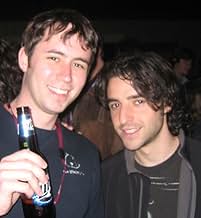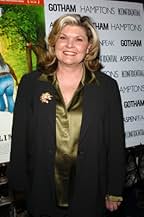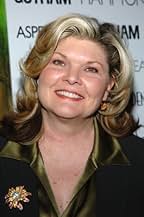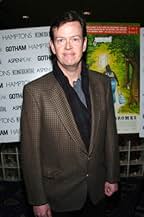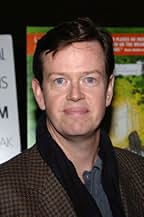Aviva tem treze anos, é desajeitada e sensível. Sua mãe Joyce é carinhosa e amorosa, assim como seu pai Steve, um cara comum que às vezes tem um temperamento feroz. O filme gira em torno da ... Ler tudoAviva tem treze anos, é desajeitada e sensível. Sua mãe Joyce é carinhosa e amorosa, assim como seu pai Steve, um cara comum que às vezes tem um temperamento feroz. O filme gira em torno da família, amigos e vizinhos de Aviva.Aviva tem treze anos, é desajeitada e sensível. Sua mãe Joyce é carinhosa e amorosa, assim como seu pai Steve, um cara comum que às vezes tem um temperamento feroz. O filme gira em torno da família, amigos e vizinhos de Aviva.
- Direção
- Roteirista
- Artistas
- Prêmios
- 3 indicações no total
Avaliações em destaque
I've seen a lot of strange films in my life, but this has to be right up there. Compared to this, "Happiness" was a crowd-pleasing knockabout comedy. I have to say that I found "Palindromes" hard going, even boring at times, although there was definitely a slow burn quality and by the end I was pretty much drawn in.
The film plays rather like a cross between Luis Bunuel and a live action "South Park". The multiple-actress technique pioneered in "That Obscure Object of Desire", deadpan style and flat picture quality on the one hand, taboo-breaking humour, song 'n' dance and perverse exploration of moral issues on the other.
I wonder what a conservative audience would make of this film. My guess is that it's aimed squarely at a liberal audience, but it absolutely refuses to pander to liberal prejudice, instead laying into the "pro-choice" position in a manner which can only be described as destruction testing. I get the feeling that Solondz is challenging his own opinions on the issue, as much as ours. Pro-lifers might see the storyline as vindicating their beliefs, but I dare say would be so horrified by other aspects of the film that they wouldn't make it to the end.
This is probably Solondz' bleakest movie to date, despite moments of (very dark) humour. Scientific rationalism is weighed against religious fundamentalism and both are found utterly wanting.
Incidentally there is no rape in this film, despite comments elsewhere, although there are certainly very disturbing scenes.
A brave movie, overall. I'm sure Solondz could take the David Lynch/John Waters route towards the (relative) mainstream with considerable success, but "Palindromes" sees him driving determinedly in the opposite direction, in every respect.
Very parallel to Alexander Payne's "Citizen Ruth" in covering some of the same territory about abortion, writer/director Todd Solontz mostly eschews that film's satire and easy jabs for a protean look at an issue that has a more complicated emotional landscape than advocates on either side usually concede.
He does this by literally taking us inside the mind of a young malleable adolescent who intentionally gets pregnant and is surprised at the reactions of those around her. Sometimes we see her as she sees herself, as if we are reading her diary, with her body-hating hopes for a change in hair, skin, age or family, and sometimes we see her as others see her.
Every one wants to control "Aviva" and their hypocritical selfishness is laid bare, regardless of their various good intentions. Her mother sees her still as a baby (a welcome back to the screen for Ellen Barkin who manages to add maternal warmth to hostile dialog) to the discomfiting sexualization (Britney-ization?) of just barely teens that is just barely a step above pedophilia, to how she is seen by pro-life advocates (whose Sunshine Band for "special children" seems almost as exploitative as JonBenet Ramsey's performances) and on in a picaresque dream scape that crosses a nightmare that is a bit extreme, especially for fans of "Welcome to the Dollhouse."
Solontz pulls this off by having every image of "Aviva" (according to the director's production notes) "portrayed by two women, four girls (13-14 years old), one 12-year-old boy, and one 6-year old girl" of widely variant size, shape, color and just about every other possible outward characteristic, even though one haranguer points out that no one can ever really change.
Solontz in a hand-out at the theater defined his use of the title as meaning "a condition of stasis and/or immutability; that part of one's personality or character that resists change, stays the same," but I'm not sure that successfully comes through in this provocative film, especially with some of the acerbic dialog and disturbing actions.
Nathan Larson's music is appropriately eerie, with spooky vocalizations by Nina Persson.
Releasing the film without a rating will probably keep it from being seen by young teens which is too bad as it is a frank and fresh look at the pressures on girls from friends, family and society.
Many times Solondz's films are misunderstood. They are often deemed sacrilegious, vulgar, or plainly disgusting. If you are one of these people shame on you, Solondz simply explores and exploits major issues that happen everyday. No other director besides Larry Clark is bold enough to do this. Personally, I think the dialogue in Solondz's films is brilliant and witty. He chooses tasteful casts that depict their characters perfectly. The audience is able to easily relate to the characters or simply hate them. I praise Solondz for his work.
If you haven't seen the film, please stop reading here.
In this new film, Todd Solondz takes us back to the Wieners, the family that he introduced to us in his debut, as we watch the closed casket of Dawn. At the same time we are shown another family that are related to the Wieners, the Victors. The director loves to examines the family dynamics, as it's the case with the study he does on the Victors.
Aviva Victor is a girl who wants to have a child. Alas, it's not going to happen any time soon. We see, in painful detail what this young woman does to her suburban parents. Joyce, the mother, is shocked and horrified. There's only one thing in her mind to do: Aviva is made to have an abortion, to which she doesn't agree, but one that is forced on herself.
Joyce, the materialistic mother, in a scene that is about the best thing in the film, tries to reason with Aviva and offers her own story about how she had also aborted a baby, who would have been named Henry, after her father. Her motives are purely based on whatever sacrifices the arrival of the unwanted baby would have meant in the Victors life.
Aviva, after the botched abortion by Dr. Fleisher, takes to the road in a way to show her rebellion against what has been forced on her. Aviva, for her young age, is extremely wise as to what to do and what to expect from the different people she meets along the way.
The device by Mr. Solondz to have eight different actors play Aviva, pays up in a way one wouldn't even have thought it would. Each one of the actor/actress leaves his/her own imprint in playing this disturbed girl. The most appealing of the different people playing the girl is the "Sunshine Aviva", the Afro-American that makes quite an impression in her take on this sad lost soul.
When Aviva is found by the side of a brook, the kind Peter Paul brings her to the Sunshines' home. These amazingly couple are too good to be true, as one discovers later on. The motherly Mama Sunshine is anyone's idea of how a mother should be. Not having family of her own, they have taken about a dozen children, each with a physical problem, but who appear to lead a happy existence with the Sunshines.
Peter Paul takes Aviva one day to the dump site where some of the discards from the abortion hospital take the fetuses. Aviva is horrified, she identifies to the fact that wanting to have a child of her own, this reality hitting her in the face is too much for her. Aviva then takes to the road again with the man she has had a sexual encounter before. This proves fatal as he is a man on a mission, an executioner that acts for the hate group that the Sunshines belong to.
The film is multi layered with an incredible texture between the adventures Aviva experiences. "Palindromes" is a hypnotic film. Any viewer falling under its spell is in for a magic ride guided by Todd Solondz.
What the director has gotten from this talented cast is one of the best ensemble playing from any indie film this year. Ellen Barkin has one of the best moments of her career as Joyce Victor in the sequence where she tries to explain to Aviva the reason for aborting. Debra Monk, a fine, but underused actress, is magnificent as Mama Sunshine. Ms. Monk's appearance shows us a woman that on the surface is something, when in reality she is a monster. Sharon Wilkins, the "Sunshine Aviva" gives a compassionate reading that reveals so much of the young girl she represents. Alexander Brickel's Peter Paul, the boy that befriends Aviva, plays the sweet boy perfectly. Also in the cast, the wonderful Stephen Adly Guirgis, who plays the right wing enforcer fanatic.
Mr. Solondz is to be congratulated in getting a tamed performance from the otherwise intense Jennifer Jason Leigh, who plays one of the most quiet Avivas.
This film proves that Mr. Solondz loves to takes chances in telling stories that are dark and not commercial, but he makes them resonate with his viewers because he doesn't compromise with what he perceives as the truth around him. This is a man who is not a wishy washy when it comes to taking chances in being an original.
Você sabia?
- CuriosidadesHeather Matarazzo turned down reprising the role of Dawn Wiener in this film.
- Erros de gravaçãoAviva is cradling a baby doll in her hands, then her mother comes in and they talk, and Aviva puts the doll down on the bed. During the conversation the doll's clothes change and the doll's position also changes a few times during the scene.
- Citações
Mark Wiener: People always end up the way they started out. No one ever changes. They think they do but they don't. If you're the depressed type now that's the way you'll always be. If you're the mindless happy type now, that's the way you'll be when you grow up. You might lose some weight, your face may clear up, get a body tan, breast enlargement, a sex change, it makes no difference. Essentially, from in front, from behind. Whether you're 13 or 50, you will always be the same.
'Mark' Aviva Victor: Are you the same?
Mark Wiener: Yeah.
'Mark' Aviva Victor: Are you glad you're the same?
Mark Wiener: It doesn't matter if I'm glad. There's no freewill. I mean, I have no choice but to chose what I choose, to do as I do, to live as I live. Ultimately, we're all just robots programmed abritrarily by nature's genetic code
'Mark' Aviva Victor: Isn't there any hope?
Mark Wiener: For what? We hope or despair because of the way we've been programmed. Genes and randomness, that's all there is and none of it matters.
'Mark' Aviva Victor: Does that mean you're never going get married and have children?
Mark Wiener: I have no anent desire to get married or have kids. But that's beyond my control. Really, it makes no difference. Since the planet's fast running out of natural resources and we won't make it into the next century.
'Mark' Aviva Victor: What if you're wrong? What if there is a God?
Mark Wiener: That makes me feel better.
- Cenas durante ou pós-créditosIn loving memory of Dawn Wiener.
- Trilhas sonorasLullaby
(Aviva's and Henrietta's Theme)
Written by Nathan Larson
Performed by Nina Persson and Nathan Larson
Principais escolhas
- How long is Palindromes?Fornecido pela Alexa
Detalhes
- Data de lançamento
- País de origem
- Idiomas
- Também conhecido como
- Palindromes
- Locações de filme
- Kingston, Nova York, EUA(Restaurant & parking lot scene with Bob & Aviva. Superlodge 129 Route 28)
- Empresa de produção
- Consulte mais créditos da empresa na IMDbPro
Bilheteria
- Faturamento bruto nos EUA e Canadá
- US$ 553.368
- Fim de semana de estreia nos EUA e Canadá
- US$ 57.251
- 17 de abr. de 2005
- Faturamento bruto mundial
- US$ 809.686
- Tempo de duração
- 1 h 40 min(100 min)
- Cor
- Mixagem de som
- Proporção
- 1.85 : 1


